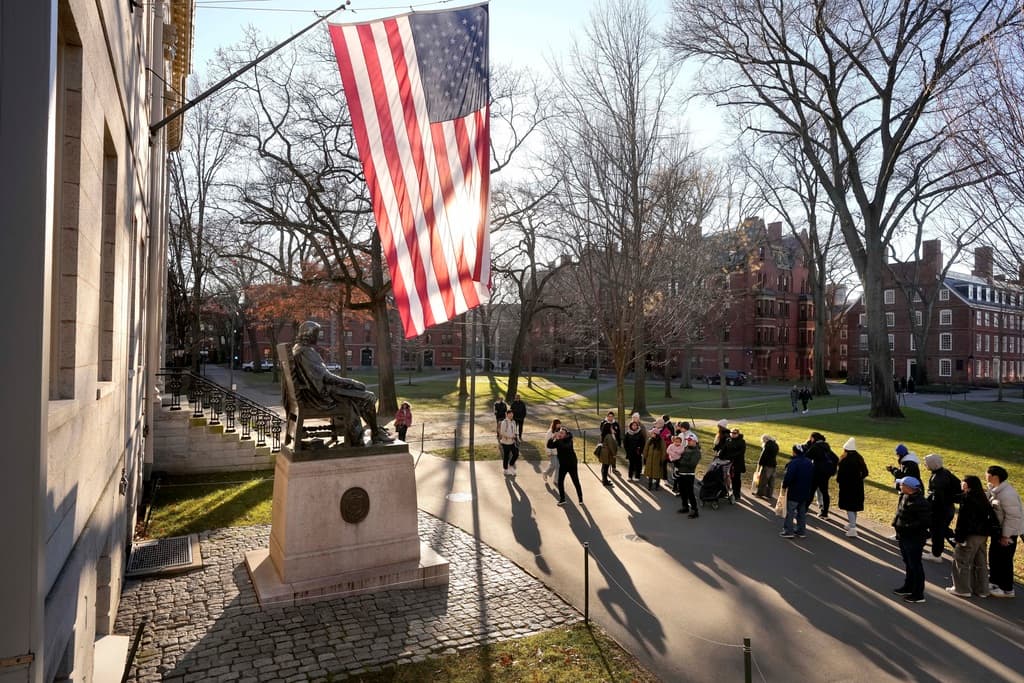Harvard University, Facing ‘Devastating’ Financial Threat From Trump, Recruits MAGA-Friendly Lobbying Firm
The move marks a significant departure from the university’s adversarial approach to Trump during his first presidency.

Harvard University, bracing for a second Trump administration and a Republican majority Congress, is recruiting a MAGA-friendly lobbying firm to advocate on the school’s behalf.
Ballard Partners, the Ivy League University’s pick to head its “government relations and advocacy services,” has strong connections to both the president-elect and members of his incoming administration.
At the top, the firm’s head and founder, Brian Ballard, has been chummy with President Trump since his first term in office and was a major fundraiser for his recent presidential campaign. Trump’s incoming chief of staff, Susie Wiles, who helped manage his 2024 campaign, was a partner at Ballard until 2019. The president-elect’s nominee for American attorney general, Pam Bondi, also served as a partner at Ballard, joining the lobbying firm after leaving her role as Florida’s attorney general.
Ballard Partners’ clients include notable technology giants like Amazon and Google. The firm was also recently tapped by the Anti-Defamation League to assist with its work on antisemitism policy. The ADL, similar to Harvard, has found itself in uncharted waters with the president-elect.
The move comes as Republican lawmakers are expected to introduce legislation Wednesday that would significantly raise the tax rate on university endowments, which currently maxes out at 1.4 percent, to be on par with the 21 percent corporate tax rate.
“Elite private universities have accumulated and sit on massive university endowments and pay a tax less than 2 percent on the investment earnings of their endowments, which is far lower than what most hardworking Americans pay in taxes. Meanwhile, these universities have significantly increased tuition for America’s youth, which has overwhelmingly surpassed the average annual inflation rate,” a sponsor of the bill, Congressman Troy Nehls, tells Fox News.
Harvard’s latest hiring marks a significant departure from the university’s adversarial approach to Trump during his first presidency. Following Trump’s 2016 election Harvard’s then-president, Drew Faust, described the president’s immigration policies and his pledge to divert federal funding from academic research as an “assault” on the relationship between the federal government and institutions of higher education and fiercely lobbied to challenge Trump’s proposals. She wrote an op-ed for the New York Times defending humanities studies funding and filed two amicus briefs challenging Trump’s executive orders.
However, Harvard’s current president, Alan Garber, has been teeing up a shift for months. During a closed-door meeting with Harvard faculty in December, Mr. Garber cast doubt on his university’s existing communications strategy and expressed his intention to adopt a more cooperative approach to the incoming administration. He further acknowledged that lawmakers’ frustrations with the school contained elements of truth and suggested that Harvard should listen to public criticism with “empathy and humility,” according to the Harvard Crimson.
Trump, for his part, has pushed for significant reforms to America’s higher education institutions and made clear his willingness to leverage federal funding to pressure noncompliant universities. With various financial levers at Trump’s disposal, governmental retaliation could tip even the country’s most well endowed universities into an “existential crisis.”
The threat of a jacked-up endowment tax also looms large for many universities. In addition to the latest GOP-backed bill, Trump’s vice president-elect, J.D. Vance, has endorsed increasing the highest tax rate on school endowments to 35 percent from 1.4 percent. An economics professor at Wellesley College, Phillip Levine, has decried the potential tax as “devastating” and warned that it would “result in massive cuts” to schools’ operating budgets and “deteriorate the educational opportunities they offer.”
Mr. Garber has said the possibility of such a tax, which would carve out a sizable chunk from the school’s $53 billion endowment, “keeps me up at night.” It’s no surprise, given that Harvard has already been grappling with financial pressure amid donor and alumni backlash. Over the past year, several big-spending donors publicly declared that they were pulling the plug on their generous gifts to the university. The university eventually recorded, in its 2024 financial report, the largest collapse in annual total donations in a decade.
Harvard has faced a barrage of criticism over its handling of antisemitism and the anti-Israel protests that exploded on its campus since the war at Gaza started. Harvard’s troubles began just hours after Hamas’s October 7 attack, when more than two dozen student groups issued a letter calling Israel “entirely responsible” for the massacre. The erstwhile president, Claudine Gay, took two days to issue a statement that neither condemned Hamas nor addressed the student letter. A day later she denounced Hamas’s attack as “terrorist atrocities.”
Ms. Gay caught more flak when she failed to answer “yes” when asked by a member of Congress if calling for the genocide of Jews violated Harvard’s rules. Criticism over Ms. Gay’s disastrous testimony and her mishandling of antisemitism at Harvard, on top of accusations of plagiarism, led her to resign in January 2024.
Like several other Ivy League universities, Harvard’s missteps drew the attention of members of Congress who eventually launched a multi-pronged probe into its campus antisemitism. Disgruntled Jewish students have also come out against Harvard, with six students currently suing the university for failing to protect them from the “severe and pervasive” antisemitic discrimination that has caused the school to become “a bastion of rampant anti-Jewish hatred and harassment.”

